INDIAN ARMED FORCES CHIEFS ON OUR RELENTLESS AND FOCUSED PUBLISHING EFFORTS

The insightful articles, inspiring narrations and analytical perspectives presented by the Editorial Team, establish an alluring connect with the reader. My compliments and best wishes to SP Guide Publications.

"Over the past 60 years, the growth of SP Guide Publications has mirrored the rising stature of Indian Navy. Its well-researched and informative magazines on Defence and Aerospace sector have served to shape an educated opinion of our military personnel, policy makers and the public alike. I wish SP's Publication team continued success, fair winds and following seas in all future endeavour!"

Since, its inception in 1964, SP Guide Publications has consistently demonstrated commitment to high-quality journalism in the aerospace and defence sectors, earning a well-deserved reputation as Asia's largest media house in this domain. I wish SP Guide Publications continued success in its pursuit of excellence.
- Operation Sindoor: Resolute yet Restrained
- India’s Operation Sindoor Sends a Clear Message to Terror and the World – ‘ZERO TOLERANCE’
- Japan and India set forth a defence cooperation consultancy framework, talks on tank and jet engines
- Terrorist Attack in Pahalgam in Kashmir: Unfolding a long surgical war against PAK
- Lt General Pratik Sharma takes over Command of Indian Army's Northern Command
BRICS Blows the Bugle
Exploring the implications, tensions, and challenges in an expanded BRICS alliance
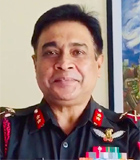 |
The Author is former Chief of Staff of a frontline Corps in the North East and a former helicopter pilot. He earlier headed the China & neighbourhood desk at the Defence Intelligence Agency. He retired in July 2020 and held the appointment of Addl DG Information Systems at Army HQ. |
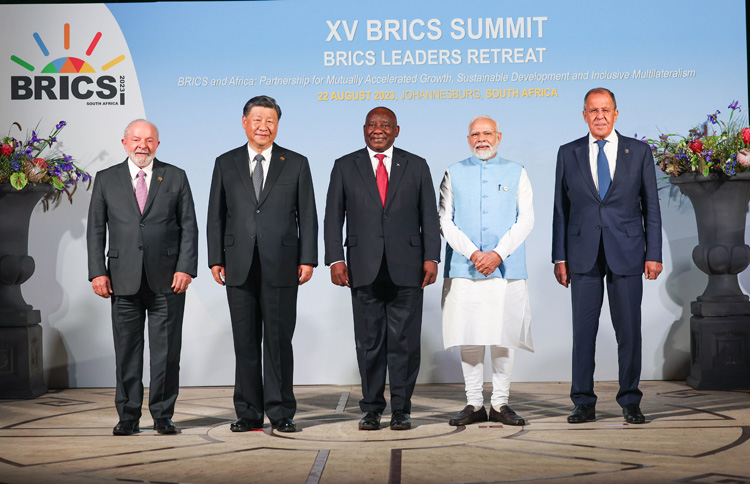
Summits are always high on symbolism, grandstanding and showmanship. Political leaders love summits as they give them an opportunity to flaunt on a bigger stage, away from domestic troubles and nitty gritty of governance. However, outcomes from most summits expose the huge gap between principle and practice and between rhetoric and reality.
Rhetoric vs Reality
The G7 communiqué after its summit in Hiroshima, for example, offers support to Ukraine "for as long as it takes". This open-ended support is obviously riding on the assumption of an eventual partial or total military defeat of Russia. Even if for a moment we accept possibility of such an outcome, it can only come with terrible cost for the Ukrainian people and loss of lives in Russia too apart from prolonged disruption in the supply chain of food, fertiliser and fuel. Creation of another Afghanistan in the heart of Europe is a more probable outcome. So much for rhetoric and reality.
Political summits are a stage for grandstanding and showmanship. However, the divide between principle and practice, rhetoric and reality become apparent in summit outcomes.
Then there are those flashy high decibel climate summits that have one consistency, lofty goal setting. At the end of the 26th Conference of the Parties (COP26) on climate change in November 2021, the Glasgow Climate Pact mentions the need to move away from the use of coal. But barely months after the Glasgow conference, the war in Ukraine and the disruption of clean Russian natural gas to Europe saw coal power plants back in flavour in Europe.The goal of containing global warming to 1.5 degrees Celsius is barely surviving on life support.
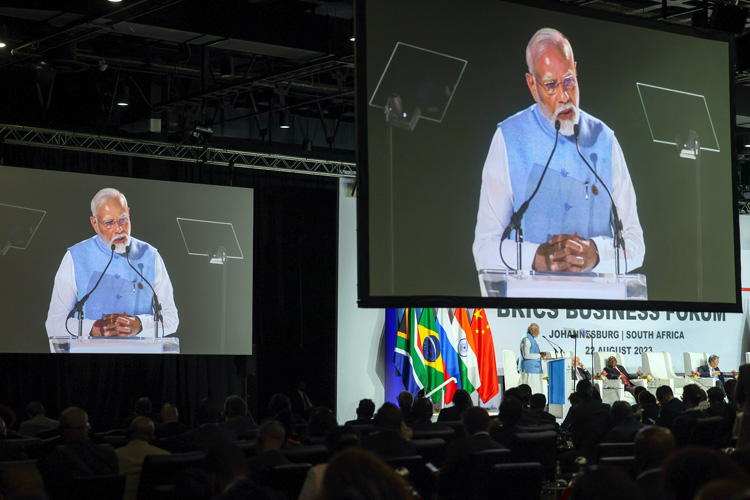
A Seismic Shift in Global Dynamics
So, was the 15th BRICS summit in South Africa's Johannesburg any different? Well, let's understand the takeaways and analyse. The most far-reaching outcome is the much-anticipated expansion of the grouping to include six new countries. Argentina, Saudi Arabia, the UAE, Egypt, Iranand Ethiopia will become members of the grouping in January 2024. That declaration raises the scope and import of BRICS grouping to absolutely new levels, signalling perhaps the beginning of a seismic shift in global geopolitics and geoeconomics, away from the hegemony of the West.
The 15th BRICS summit marks a seismic shift with the inclusion of six new countries. This expansion strengthens BRICS' economic control and geopolitical impact, potentially challenging Western hegemony.
This strategic expansion propels BRICS's combined GDP to a staggering 30 per cent of the global economy. More significantly, it bolsters the bloc's control over a substantial portion of the world's oil production and consumption, reaching a remarkable 80 per cent. The inclusion of Saudi Arabia, the UAE, and Iran within BRICS brings forth a momentous shift in the world's oil landscape, with the world's biggest oil producers and biggest oil consumers as part of the alliance. Bilateral arrangements such as the Saudi-China oil tradeusing Renminbi, the India-UAE and India-Russia agreements to trade in Indian Rupee, the France-UAE deal to buy LNG using Chinese digital Yuan and many African and Latin American countries deciding to trade in local currencies have focused attention on BRICS working on options to replace the dollar.
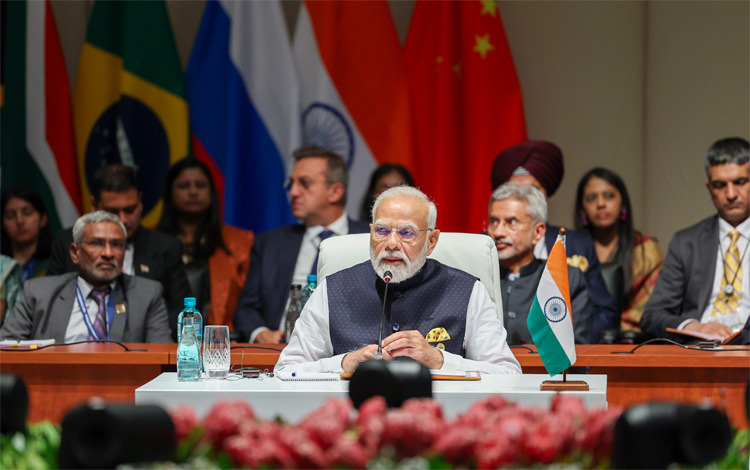
To soothe western concerns and not paint these efforts as part of a conspiracy against the US led West, South Africa's BRICS ambassador, Anil Sooklal, has said that the goal is less about replacing the dollar than giving the world more choices. Hence the push to strengthen the BRICS New Development Bank which offers succour to countries that do not want to meet the stringent and often choking political conditions that the US and its trans-Atlantic partners imposed on them to get financing from the IMF. Years and years of austerity imposed as preconditions by the IMF on countries to avail its bailouts often leaves them reeling under high inflation like in Argentina and patchy recovery process makes them perpetually sick.
Paradigm Shift in Geopolitical Impact
The expanded BRICS may even have more geopolitical impact than geoeconomics. The US led West has continued to pursue its agenda of isolating Russia and containment of China. The Ukraine war and the renewed vigour to expand the NATO closer to the Russian borders as well as the persistent efforts to trigger a crisis around Taiwan point to US efforts at maintaining its global hegemony. Resentment is growing across Asia, Latin America and more recently in Africa. The upheaval in the Sahel region with coups in Mali, Sudan, Burkina Faso and now Niger overthrowing pro-western leaders and the new nationalist military leaders terminating highly exploitative contracts for extraction of their strategic minerals such as uranium, cobalt, gold and oil signal a new wave of assertion. It challenges the established order since the end of WW II. The growing footprint of China, Russia and to an extent India in the political, security and economic paradigm is compelling. As for attempts at isolating Russia, well, it will be interesting the following year as Russia hosts the next year BRICS summit in its expanded format with Putin hosting the leaders on the stage.
The expanded BRICS holds significant geoeconomic power, controlling 80 per cent of global oil production and consumption. This shift also challenges the geopolitical order and highlights the rise of China, Russia, and India.
Alliances such as the G7, NATO, CENTO, the former Warsaw Pact, the EU, the OIC or the OPEC grew out of their members' common interests. Not so with the BRICS. The acronym was coined in 2001 by Goldman Sachs, a bank, as a marketing tool to attract investment into four of the world's largest, fast-growing middle-income countries (South Africa was not originally part of the club). The very first summit of its leaders was only held in 2006 alongside the UN General Assembly. Delegates from the four countries met more formally in Yektarinburg, Russia in 2009 to give an institutional form to 'BRICs.'
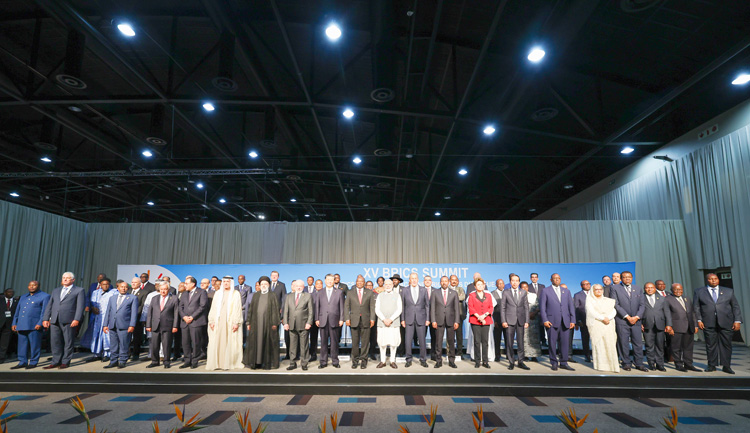
Challenges and Prospects for an Expanded BRICS
Admittedly, the existing BRICS itself is not cohesive. An expanded one with the incoming six new members will be even more cacophonous and discordant. Despite recent thaw and reproachment, Saudi Arabia and Iran have plenty of historical baggage to sort out. China's Belt and Road initiative remains suspicious after causing serious economic meltdowns in Sri Lanka and Pakistan. India and China continue to have tense and terse situations at their borders, an issue aired by Prime Minister Modi in his brief chat with Xi Jinping on the sidelines after the summit declarations. India is a member of the QUAD perceived as an anti-China bulwark. It will require huge efforts on the part of all members to build it 'Brick by BRICS'.
The expanded BRICS faces internal discord, with historical tensions between member countries. Building a cohesive alliance will require concerted efforts.
However, the BRICS grouping comprise of countries with common economic aspirations and similar ideas on the type of multilateralism and shifts in global political economy that would be required to achieve them. The decision to admits six new members even as scores more are lining up to join only reflects this truism. Dreams come laced with challenges.





